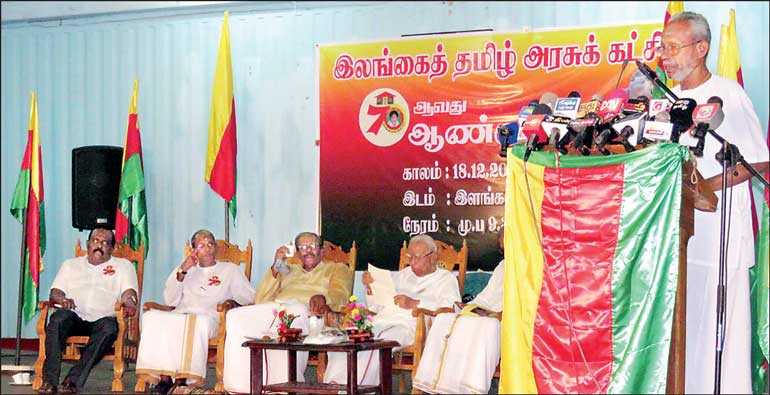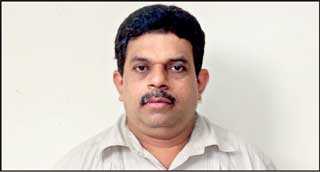Friday Feb 27, 2026
Friday Feb 27, 2026
Friday, 20 December 2019 00:00 - - {{hitsCtrl.values.hits}}

By N. Lohathayalan,
reporting from Jaffna
Rife with leadership qualities of every kind, with a heritage of many leaders who sacrificed their all, the Federal Party (a.k.a. FP, Ilangai Thamil Arasuk Katchi, ITAK) continues to work with firm faith upholding the right of the Tamil people to maintain their identity, and establish a governance structure that would  help them protect this right to maintain and their unique ethnic identity, arts, culture, language, religious practices through self-determination for our people. It is to protect and win these rights that the FP continues to labour with tenacity.
help them protect this right to maintain and their unique ethnic identity, arts, culture, language, religious practices through self-determination for our people. It is to protect and win these rights that the FP continues to labour with tenacity.
In this country the FP is the Tamil people’s most important party with the longest and continuing history. As it celebrates 70 years of service today and its contributions are reviewed today, I wish to review the FP’s great leaders, their great virtues and leadership.
S.J.V. Chelvanayagam, K. Vanniasingam, N.R. Rajavarothayam, Medical Dr. E.M.V. Naganathan, S.M. Rasmamanickam, A. Amirthalingam, Rajavarothayam Sampanthan, and Mavai Senathirajah are the great history-makers who laid the foundations for our party’s proud heritage.
Indeed it is possible to write a whole book on each of these great men. Many books have been written already. An excellent leader must lead, be a sound example to his followers, must command the faith and allegiance of his followers, and enthral followers through his charisma. Moreover, he must have the vision to examine current events and forecast the future in leading the party.
The late S.J.V. Chelvanayagam is called Father (Thanthai) Chelva, and the Gandhi of Eelam, and is hailed as a Political Prophet.
In the 1947 elections he was elected as a Ceylon Tamil Congress Member of Parliament. In the backdrop of the D.S. Senananayake government in the immediate aftermath of independence taking away the voting and citizenship rights of upcountry Tamils through legislation, Thanthai Chelvanayagam broke off from G.G. Ponnambalam’s Congress and founded the FP on 18 December 1949.
Dr. E.M.V. Naganathan, K. Vanniasingam and others joined SJV in this revolt within the Tamil Congress. Foreseeing that what was happening to upcountry Tamils then may happen to us later, he saw the inexorable push to found an entity that would facilitate all Tamil people living in dignity and with self-respect. This was the political underpinning of the FP.
In founding the FP Thanthai Chelva was well aware that he and those associating with him would face numerous hardships. Yet he did not falter and took his decision to found the FP with clarity of thought and courage in his heart.
At the very founding of the FP, he made a firm commitment to the Tamil people’s right to self-determination, a federal government with a Tamil province and a similar Sinhalese province joined together under a common central government, and a socialist economy free of exploitative forces. These were the grand new party’s targets and goals.
With a view to proving that the Tamil people never gave their consent to the Srimavo Government’s new constitutional framework of 1972, he challenged the government by resigning from his parliamentary seat and daring Mrs. Bandaranaike’s party to contest against him.
Thanthai Chelva could well have kept his seat and its privileges and asked some other MP from the FP to resign. But he was too great for that. On 3 October 1972, in resigning from his seat he made it a central point to say that a major aspect of his protest was that the hill-country Tamils had their parliamentary representation robbed and the places of their MPs were used to increase the number of Sinhalese MPs well above their share of the population.
At that very time Thanthai Chelva had the foresight to know that the Srimavo government lacked the democratic convictions to hold the by-elections immediately. It proved right. The delayed by-election denied the people of KKS of a representative and the government was ultimately forced to hold the by-election on 6 February 1975 only as the legitimate tenure of the 1970 parliament came to a close. In an electorate of 36,569 electors, S.J.V. Chelvanayagam obtained 26,927 (72.55%) votes against the government’s Communist party candidate V. Ponnamabalam’s 9,457 (26.46%) votes – a significant majority of 16,470 votes!
Looking back at the qualities of this moral and intellectual giant, in the 5 June 1956 Galle Face nonviolent Sathiyagraha challenge to SWRD Bandaranaike’s inimical language laws, his son Chandrahasan was attacked by Sinhalese goons. Thanthai Chelva retained his composure and continued to sit without breaking his Sathiyagraha. At a later stage of this just struggle against iniquity to Tamils, when Vanniasingam accepted the mantle of party leadership, his garments were torn and ripped off him by Sinhalese thugs and he was assaulted. Mr. Amirthalingam was beaten on his head and the duo went to Parliament with their wounds and bandages soaked in blood. Together they opposed the Sinhalese-Only legislation that rendered Tamils second class in their own country.
It was Thanthai Chelva who first politically brought the North and the East together. With friendship towards Muslims as Tamil-Speakers, he attracted the Muslim people to the Tamil people in friendship. As a result of his far-sighted vision for a united Tami region, on behalf of the Federal Party he nominated Kariappar for the Kalmunai seat, Mohammad Ali for the Mutur seat and Musthapha for the Pottuvil seat. All three with Muslim and Tamil votes favouring a federal solution to our problems, were handsomely returned.
Recognising the inveterate opposition to Tamil rights, it was Thanthai Chelva who first drew the attention of the International Community and their obligation to help us solve our problems that we were unable to. On 4 Sept. 1975, he submitted a memorandum to the International Commission of Jurists, the ICJ. With a view to obtaining their sympathy and intervention, Thanthai Chelva with Amirthalingam visited M. Karunanithy and Prime Minister Indira Gandhi, besides others in India, and explained our problems there. Following that, it is now well-accepted history that Mrs. Gandhi herself praised Mr. Amirthalingam’s leadership qualities. It is the meeting between Mrs. Gandhi and Mr. Amirthalingam that laid the seeds for India’s interest in and concern for the sufferings of Tamils in this country.
The credit for bravely standing up to police brutality within the Jaffna Police Station itself with unmitigated courage, goes to Dr. E.M.V. Naganathan and Mr. A. Amirthalingam.
As for Dr. Naganathan, he on every occasion that any Sinhalese leader exhibited hauteur of any kind, showed his mettle and bravado. His was a heart that feared nothing. During the 1961 Satyagraha when the government Agent for Jaffna tried to leave the Kachcheri, Naganathan laid himself on the load in front of the vehicle. He was baton charged by the police for that. Probably on that occasion or perhaps another, the baton broke upon hitting him. For that he earned the people’s respect and the sobriquet “Iron Man.”
After serving as the Federal Party leader for six years, Thanthai Chelva in the year 1955 at the once in 3-years party Conclave in Trincomalee, passed on the leadership to K. Vaniasingam and took on the post of party General Secretary. Following his example, at every conclave it became the tradition of the FP to select one of the senior members as the new Secretary General. Credit for this greatness goes to Thanthai Chelva. Few other parties have this kind of internal democracy.
The time Vaniasingam was the FP leader was troublesome for the Tamil people and riddled by crises. In particular, this was the time we faced the implementation of the Sinhalese-Only Act, and the fears and tribulations of the 1958 communal attacks on the Tamil people. Vanniasingam bravely spoke of our woes in and out of parliament, and grew the FP as a popular force. At public meetings he answered questions like a sophist and handled difficult questions by turning them into a difficult question directed at the person asking the question to make that person feel awkward.
When confronting K.M.P. Rajaratne who was wont to spewing rabid nationalism, Vanniasingam remarked “Hey! Your name is Konarage Mudiyaansalaage Podiappuhamy Rajaratna. You carry the ancient heritage of the Tamil called Konarage.” That silenced Rajaratna.
Vanniasingam also evinced strong interest in economic development. An exemplary result of his interest is the Neervely Plantain Bunch Changam that still functions helping the people in an area that produces a good part of our plantains. In 1958 when floods hit Batticaloa, it was Vaniasingam who went there with goods to help. When our lands were subject to Sinhalese colonisation, Vanniasingam with the intention of stopping those settlements he got land allocations made to Tamil traders and made arrangements for the lands to be used for agriculture.
Mr. Amirthaingam’s debating skills have been praised by many a Speaker in Parliament.
The reason for Ceylon Tamils being regarded from 1947 onwards as a unique national ethnic people is the duo consisting of Thanthai Chelva and Mr. Amirthalingam. They believed in shared and devolved leadership just as thy pushed for the same in Sri Lankan governance. It is for the same reason and to include the Eastern Province within the effort to share Tamil leadership, that S.M. Rasamanickam was appointed Party Leader twice. He once was a representative elected as a UNP candidate. However, when that party took to the Sinhalese-Only policy, he was driven by his love for the Tamil language and for Tamil speaking people, to join the Federal Party.
Mr. R. Sampanthan served as the leader of the FP until the year 2014 ad in the Congress held that year handed over reins of FP leadership to Mavai Senathirajah. He continues as head of the TNA, but is regarded as the FP’s Great leader.
In the times of the armed war, and later too, he guarded and sustained the Tamil people’s political goals and dreams, and continued to work for these noble ends.
On top of these contributions, Mr. Sampanthan who leads the TNA, in current times has included and embraced many and in the midst of personal conflicts has cultivated agreement between those in conflict, and functions as a political savant with finesse. Like a Chanakyan, we see him accepted in the International Community as one who can and must contribute towards a solution to Sri Lanka’s deeply divisive problems. We pray for a solution within his lifetime.
Mavai Senathirajah serves the people as one who personally knows all the people and lands of the North and the East. It is for that reason that when he contested in Parliament he garnered a creditable number of votes. His nature is to include everyone. With that good natured spirit, he embraces all Federal Party members. I must record that in times when the FP faced difficulties, Mavai guarded the interests of the party and the Tamil people well.